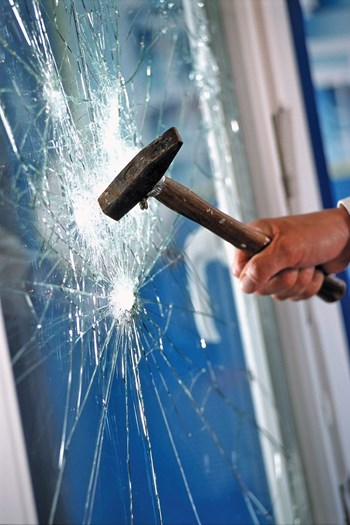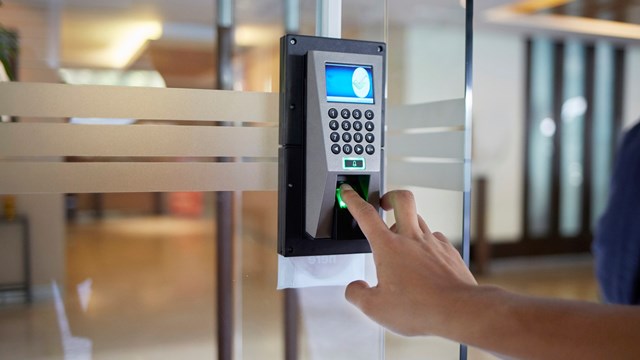
In today’s high-tech world, security can look a lot like a sci-fi movie. Golf carts can be equipped with laser systems that will read license plates and check them against a computer list of approved vehicles. Elevators will only travel to certain floors if the rider has the correct key card. From their home computer, owners can do everything from allowing a plumber entry while they are vacationing in the Caribbean to checking out the security feed from cameras in the parking lots.
But security can also mean something as inexpensive as immediately painting over graffiti and keeping the bushes clear of trash. “It’s very important. The more signs of social disorder, the more likely there is to be social disorder,” says Elliot Boxerbaum, president of Security Risk Management Consultants in Columbus, Ohio.
No matter how up-to-date or elaborate the technology, what security measures can’t do, everyone interviewed emphasized, is eliminate crime. The best you can aim for is a program that vehemently encourages criminals to go elsewhere. “I don’t care if you have FBI, CIA, and 12 police departments, you can’t stop crime. A strong security force may displace it, but it will just go somewhere else,” says Murray Levine, vice president of Wackenhut Corporation Security Services, which is the world’s second-largest employer after Wal-Mart. “The difference between a $10,000 nuisance suit and $5 million verdict is the quality of the people protecting the property.” He advises that condo boards look into hiring security officers who have a background in either law enforcement or the military, “rather than someone who came from Burger King. But guesswhat? There’s a price tag difference.”
The steps that go into creating a security program that meets an individual community association’s needs are quite varied and some of the goals don’t even involve security per se, experts say. In addition to protecting owners and their property, security also has an additional function: “It helps protect the image of a community as much as prevent a crime,” says Richard Mullan, vice president of AlliedBarton Security Services, Inc., a national firm with offices throughout New England.
No One Security “Standard”
There are no rules of thumb in terms of how much to budget for security per resident, the experts say. Nor is there such a thing as a “standard” level of security: For example, a 500-unit development in a suburb will have different security requirements than that same-sized development downtown.
In fact, in determining the desired level of security, the size of the condominiumis actually less a factor than the area’s crime rate and the owners’ expectations, experts say. (That said, state laws can kick in once a certain size is reached. In Massachusetts, for example, a mid-rise condominium must have a secure entrance.)
One of a condominium board’s more difficult balancing acts is calibrating security needs with what an owner expects in the way of amenities. Those expectations tend to be tied to the affluence of the residents. For example, a 10-unit condominium where each unit costs $5 million is going to demand an extremely high rate of service, explains Levine. “The more expensive the units, the more demanding the tenants,” he says.
While wealthy owners expect – and are able to pay for – 24-hour guards and concierge service, a 500-unit development with middle-class owners might be content with a lower-budget electronic access system on the doors. “It’s the level of the amenity – just like service levels at the Ritz may be differentthan the Hampton Inn,” says Mullan. Also, he adds, most owners don’t want to live in a police state. “If you own a condo, you don't want to feel like you’re going to the courthouse.”
Security Baseline
While the experts might agree that each development has unique security needs, there is a baseline when it comes to questions of liability. “The standardhas always been based on negligence: Is there a duty? Was there a breach of that duty? Was there damages resulting from that breach?” says attorney Stephen Marcus, a partner at Marcus, Errico, Emmer & Brooks, PC, in Braintree, Massachusetts.
In terms of protecting itself from lawsuits, a condo board might consider bringing in a security consultant firm annually to assess the community’s needs. “Certainly, if a condominium association does what a professional liability company tells them regarding security, they should be in pretty good shape,” says Marcus. And their recommendations may not be as expensive as 24-hour armed guards, headds. Sometimes, it can be as simple as additional lighting.
But if you bring in experts, warns Mullan, be careful before disregarding their advice. “That opens up Pandora’s box,” he says. Another strategy, he adds, can be to ask local law enforcement for suggestions.
For communities that are located in areas with a high crime rate, strategies should include a “broken windows” approach (named after the famous crime experiment in which unfixed broken windows quickly led to many more broken windows), that immediately repairs any vandalism to discourage further acts. “If there are beer bottles, drug paraphernalia, or condoms in the bushes, drug dealers and homeless people know they are safe, because nobody is taking care of the space,” says Boxerbaum. And then there are stronger measures. “If they are located in an area that’s high crime, we stronglyrecommend that our folks (guards) be armed,” says Levine.
Instilling a strong sense of community in residents is also a low-cost way to deter crime, whether it’s setting up a community watch or just making sure residents feel empowered to turn on a light or call the police if they hear something suspicious. “I talk to people in gated communities who say, ‘Oh, I don't know my neighbors,’ ” says Boxerbaum. “That’s ripe for crime.” (In fact, inside gated communities, much of the crime will be committed by the neighbors – or their children. “Teenagers are roving the neighborhood at 2 or 3 a.m., just seeing whose door is open,” says Mullan.)
Screening security personnel is also important, Levine says. In fact, screeningall personnel is a good idea. “Let’s say you have a high-rise community with 500 rooms, and the plumber has a master key. How are they checking his background? How are they documenting it?” asks Boxerbaum. “A lot of this is stuff [a board] can do for themselves.”
Alarms In Units
In addition to security in common areas, there are also steps that residents can take in their own units. For example, Wackenhut “strongly recommends” that every unit have an alarm system with a panic button terminating in a central station. If the system is implemented throughout the building, residents can save money in two ways: 1) They’ll get a discount on their homeowners’ insurance and 2) A bulk discount usually means the alarm costs about $15 a month, rather than around$35 or $40 per month.
While security is not typically one of the first things a condo board looks to scrimp on, the recession has caused cuts even there, say some experts – which is unfortunate, they add, since when the economy goes down, crime goes up. For example, in hard-hit real estate areassuch as Florida, “there are so many vacancies right now. Associations can’t keep up with the maintenance,” says Boxerbaum. “It’s a downward spiral.”
And neglecting maintenance can become a security issue. “Security cameras are not going to do any good if the light’s not working or if the bushes are overgrown,” says Boxerbaum.
If cameras are there, they need to be working. If they aren’t functional, “you’re giving people a false sense of security. If you just let them fall into disrepair, that certainly could create liability issues,” says Marcus.
Mullan knows of gated communitiesthat used to have armed guards at multiple entrances and now have one guard plus an electronic access gate monitored remotely by that guard. Other communities have done away with their roving patrol officers.
Downgrading security, though, can open up boards to liability. “The best thing a board could do if they were thinking of cutting back on security is present it to the unit owners. If the unit owners vote to cut back, that would help them liability-wise,” says Marcus. “Or, if the security assessors say, ‘Gee, we don't see any reason you couldn’t cut back on this level of service,’ then it’s OK. But if you're just cutting back to save money, that always can be dangerous.”
Yvonne Zipp is a freelance writer and a frequent contributor to New England Condominium magazine.






Leave a Comment